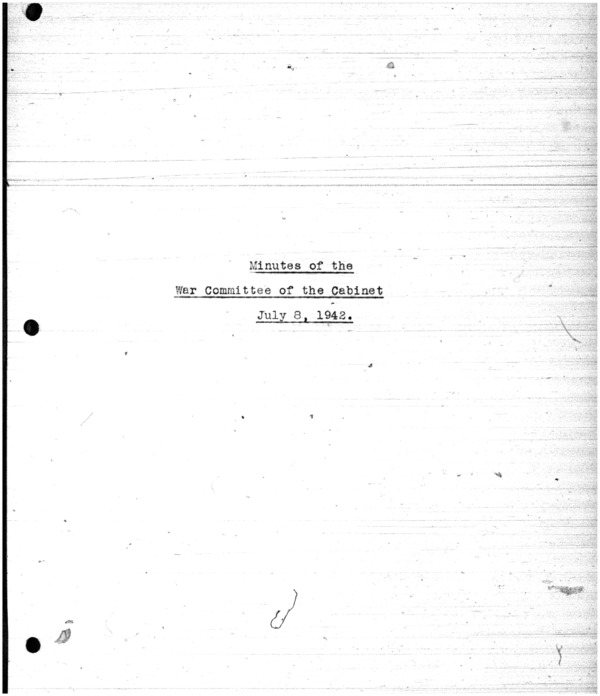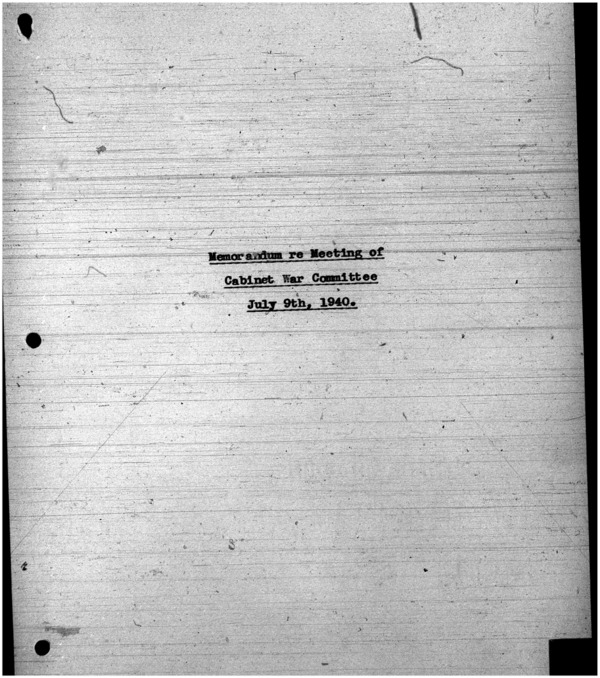Privy Council Office Fonds
Description
| Title Proper | Privy Council Office Fonds |
| Date(s) of material from this resource digitized | 1919-1951 |
| General material designation |
From this fonds, LOI has digitized 174 textual records or images.
|
| Scope and content |
This fonds comprises three series containing Privy Council Office records (Orders-in-Council, letters, memoranda, minutes, etc.). The files pertain
primarily to issues concerning people of Japanese descent in Canada in the 1940s and include such topics as the following: the termination of the War
Measures Act; a prohibition on the immigration of non-British or non-American subjects
to Canada; the naturalization of Japanese individuals and Chinese individuals in Canada; regulations regarding trading with the "enemy"; internment of "enemy aliens" in
Canada; the policing of groups labelled as "subversive"; "enemy aliens" and "alien" property;
the persecution of Jehovah's Witnesses during World War II; the Standing Committee on Orientals; Defence of Canada Regulations; government censorship of specific acts; the declaration
of war with Japan; the dispossession of Japanese Canadians; the Canadian Japanese Construction Corps; restrictions on firearms and explosives; the establishment of work camps; the British Security Co-ordination; policies regarding Japanese Canadian women and children; the terms associated with
the government acquisition of Hastings Park in Vancouver; the forcible sale of property as related to the Soldier Settlement Act; the processes
of dispossession, including evaluation of property and terms of sale and lease of
property; the budget for funds allotted to the forcible uprooting of Japanese Canadians;
the seizure of fishing vessels from Japanese Canadians; government discussion of labour
camps for Japanese Canadians; housing for uprooted Japanese Canadians; an investigation
of an alleged Japanese fascist gang connected to the Black Dragon Society; the deportation of Japanese Canadians to Japan; the appointment of Henry Irvine Bird to the position of Judge in the British Columbia Supreme Court; the labour and manpower or Japanese Canadians in labour camps; the regulations of
the British Columbia Security Commission regarding property ownership; policies adjusted to allow Japanese Canadians to work
in the lumber industry; the education of Japanese Canadian children in Alberta; the regulations of the Canadian criminal code and Soldier Settlement Act; the conscription
of two men into non-combat roles in the Canadian army; Japanese Canadians holding
land and growing crops; regulations pertaining to the release of secret and confidential
information to foreign powers; legal action taken by Japanese Canadian individuals
against the Attorney General of Canada; the establishment of the Bird Commission and various judges appointed to serve on the Royal Commission; negotiations between
the Government of British Columbia and the Minister of Labour pertaining to the funding and well-being of uprooted Japanese Canadians; and an agreement
between the Government of Manitoba and the Minister of Labour pertaining to the well-being of Japanese Canadians.
|
| Name of creator |
Canada. Privy Council Office
created this archive.
|
| Immediate source of acquisition |
The digital copies of the records were acquired by the Landscapes of Injustice Research
Collective between 2014 and 2018.
|
Structure
| Repository | Library and Archives Canada |
Digital Objects (174)
Metadata
Download Original XML (68K)
Download Standalone XML (72K)
Title
Privy Council Office Fonds
Publication Information: See Terms of Use for publication and licensing information.
Source: Library and Archives Canada
Terminology
Readers of these historical materials will encounter derogatory references to Japanese
Canadians and euphemisms used to obscure the intent and impacts of the internment
and dispossession. While these are important realities of the history, the Landscapes
of Injustice Research Collective urges users to carefully consider their own terminological
choices in writing and speaking about this topic today as we confront past injustice.
See our statement on terminology, and related sources here.
![Facsimile: Memorandum: Re: Japanese work camps on the Blue River Highway [July 14th]](https://landscapesofinjustice.uvic.ca/archive/media/TINA/facsimile/thumbs/lac_memo_re_japanese_work_camps_on_the_blue_river.jpg)

